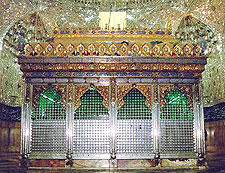 In 2004, following a 30-year moratorium during Saddam Hussein's dictatorship, Iraq's Shiite Muslim population were free to commemorate Ashura, the most important holy day on the Shiite calendar. Shia adherents from throughout the Mideast made the pilgrimage to Kerbala, Iraq's Holy City, to visit the tomb of Imam Hussein and Imam Abbas, heirs to the Prophet Muhammad who died as religious martyrs in 680 A.D.
In 2004, following a 30-year moratorium during Saddam Hussein's dictatorship, Iraq's Shiite Muslim population were free to commemorate Ashura, the most important holy day on the Shiite calendar. Shia adherents from throughout the Mideast made the pilgrimage to Kerbala, Iraq's Holy City, to visit the tomb of Imam Hussein and Imam Abbas, heirs to the Prophet Muhammad who died as religious martyrs in 680 A.D.
In THE ROAD TO KERBALA, filmmaker Katia Jarjoura joins the procession of religious celebrants on the 100-kilometer walk from Baghdad to Kerbala, a journey that offers rare insights into the political and religious turmoil of post-Saddam, U.S.-occupied Iraq. Hamid el Mokhtar, a poet and novelist imprisoned during Saddam's regime, accompanies the filmmaker and throughout the film offers a religious but open-minded-and occasionally sardonic-perspective on events.

During the course of the 3-day trek, they receive food and lodging from coreligionists living along the route, encounter U.S. troops, a roadside bomb scare, and a reenactment of the historic Battle of Kerbala. They also witness expressions of religious fervor and political dissent, including denunciations of Saddam's Sunni-dominated regime, angry protests of the U.S. Occupation, support for the Mehdi Army of radical Shiite cleric Moqtada al-Sadr, and cries for the formation of an Islamic republic. THE ROAD TO KERBALA thus offers an unusually frank and revealing look at recent changes in Iraqi society, including an impassioned exercise of newfound freedoms of expression.

Arriving in Kerbala, the film reveals the beautifully ornate designs of the city's buildings and religious shrines. Hamid, along with thousands of other Muslims, struggles through the thronging crowd to touch the tomb of the martyred Shiite Princes, while others express their religious devotion in often bloody rituals of self-punishment. In contemporary Iraq, however, as THE ROAD TO KERBALA makes clear, these fervent celebrations of Muslims who chose to die for a just cause have more than just ancient historic resonance.
"Highly Recommended! Excellent! A valuable addition for collections in Middle Eastern and Religious Studies."—Educational Media Reviews Online
"Reflects Iraq's complex state as the country emerges from its cave. Iraq's Shi'ites, after centuries of marginalization, have arrived, and Jarjoura's film shows them rising from their knees and taking their first tentative steps."—The Middle East Quarterly
2006 Middle East & Central Asia Politics, Economics, and Society Conference
2004 Festival dei Popoli (Italy)
